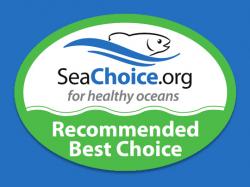SeaChoice: Aquaculture Stewardship Council Certified Salmon Isn't A 'Good Alternative'
June 5, 2017 | 2 min to read

VANCOUVER/HALIFAX — Today’s decision by a renowned seafood recommendation program to label some eco-certified farmed salmon as a “Good Alternative” for consumers is faulty, according to SeaChoice, a collaboration among Canadian environmental groups. Seafood Watch published its recommendations today following a review of the Aquaculture Stewardship Council’s (ASC) salmon certification standard.
“We’re concerned that the salmon standard — as evaluated by Seafood Watch — is not being applied,” says Kelly Roebuck, SeaChoice representative from the Living Oceans Society. “Every farm certified in Canada departs from the standard and requires variances to the ASC’s environmental health requirements.”
The Aquaculture Stewardship Council is a certification and labelling body for farmed seafood that manages global standards for responsible aquaculture.
Allowing variances to meet the sustainability criteria undermines the salmon standard. SeaChoice does not recognize ASC certified farmed salmon as a “Good Alternative” equivalent for consumers because Seafood Watch did not review these variances in its benchmarking process.
“We have always maintained that the regulation of sea lice in Canada is inadequate to protect wild fish, especially small juveniles as they begin their migration,” said John Werring, senior policy analyst for the David Suzuki Foundation. “By allowing variances, ASC has diluted the value of its own standard to protect wild fish.”
Elsewhere in the world, ASC has also approved variance requests that substantially alter the salmon standard in practice. For example, in Chile and Norway, chemical and drug use far exceeds prescribed limits. In Australia, benthic monitoring procedures have been changed in favour of local regulations.
“The ASC salmon standard was set up to be a global gold standard certification through a multistakeholder Salmon Aquaculture Dialogue. Now, four years into operations, the ASC is setting new rules that override the dialogue agreements without an appropriate scientific, transparent and inclusive process,” Roebuck said.
SeaChoice is asking the ASC to repeal its variance request processes so that it can legitimately benchmark to a Seafood Watch “Good Alternative” recommendation.
SeaChoice
SeaChoice is a collaboration between the Ecology Action Centre, David Suzuki Foundation and Living Oceans Society and has been working for over a decade to improve sustainable seafood purchasing policies among retailers across Canada, as well as to provide information to help consumers make sustainable seafood choices. SeaChoice is a member of the international Conservation Alliance for Seafood Solutions. SeaChoice member groups have been active stakeholders in the ASC and the Salmon Aquaculture Dialogues for more than a decade. This has included Steering Committee representation during the dialogue, membership in the Technical Advisory Group, the sea lice working group, as well as active stakeholder engagement on ASC audits and projects.
Further information on SeaChoice website: www.seachoice.org/seafoodrecommendations/certifications/ and www.seachoice.org/improving-seafood-supply/.
Source: SeaChoice
